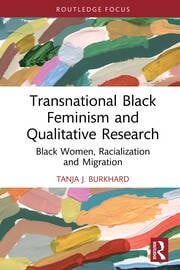In Transnational Black Feminism and Qualitative Research: Black Women, Racialization and Migration, Tanja J. Burkhard explores Transnational Black Feminism as a qualitative research framework that centres the narratives of Black women. This book is a valuable resource for those committed to conducting more equitable research that disrupts extractive modes of knowledge production, writes Lydia Ayame Hiraide, and will particularly enhance the understanding of Black women researchers seeking to conduct rigorous but sensitive qualitative research amongst and within our own communities.
This blogpost originally appeared on LSE Review of Books. If you would like to contribute to the series, please contact the managing editor of LSE Review of Books, Dr Rosemary Deller, at lsereviewofbooks@lse.ac.uk.
Transnational Black Feminism and Qualitative Research: Black Women, Racialization and Migration. Tanja J. Burkhard. Routledge. 2022.
 In Transnational Black Feminism and Qualitative Research, Tanja J. Burkhard centres the narratives of Black women as told by themselves, whilst proposing Transnational Black Feminism (TBF) as a qualitative framework to tell and analyse these stories. Over the course of 75 pages, this short text makes a theoretical, empirical and methodological contribution to the study of race, gender, migration/borders and intersectionality in the social sciences. It is written in a clear and engaging style, providing an excellent overview of and primer to Transnational Black Feminist qualitative inquiry. The framework is proposed as a way of undertaking research with people that we know and love, without compromising the quality of the research or the important relationships that sustain us.
In Transnational Black Feminism and Qualitative Research, Tanja J. Burkhard centres the narratives of Black women as told by themselves, whilst proposing Transnational Black Feminism (TBF) as a qualitative framework to tell and analyse these stories. Over the course of 75 pages, this short text makes a theoretical, empirical and methodological contribution to the study of race, gender, migration/borders and intersectionality in the social sciences. It is written in a clear and engaging style, providing an excellent overview of and primer to Transnational Black Feminist qualitative inquiry. The framework is proposed as a way of undertaking research with people that we know and love, without compromising the quality of the research or the important relationships that sustain us.
The first two chapters of the book concentrate on the key methodological and theoretical challenges and opportunities that arise from conducting research using a TBF framework. At the heart of this is Burkhard’s proposal of TBF as a research framework which supports researchers to undertake research within their own communities whilst attending to the local, national and global contexts which frame and shape the lives of Black women across time and space.
Fundamentally, TBF is a method of analysis and storytelling which contextualises ‘Black women’s ways of knowing by placing them front and center in the qualitative research process’ (3), whilst examining the structural, historical, spatial and affective forces that shape Black women’s complex, changing lives. In her use of the framework, Burkhard encourages us to think both through and beyond borders of nation states, sewing threads amongst the continents of Africa, the Americas and Europe in order to contextualise and analyse the lives of transnational Black women living in the US.
Crucially, the framework emphasises how multiple spaces simultaneously configure what we make of ourselves and of others. Using her empirical data, for example, Burkhard shows how ideas about what Blackness is are culturally, spatially and temporally contingent. TBF thus pushes back on the idea that the US (or any one state) should constitute the primary or only location of relevance for Black feminism – or that Black feminism and Black/African women located in the US are not always shaping and being shaped by other parts of the world. The framework therefore disrupts methodological preoccupations with the nation state as the primary unit of analysis. Instead, TBF proposes a transnational analytic which works to consider the relationships between different spaces and places in shaping the diverse experiences of Black women.
After setting out TBF as a qualitative framework, the latter two chapters of the book present and analyse the empirical data collected for this research. This consists of a series of interviews conducted with seven Black women with whom the author holds personal relationships of varying degrees of intimacy, as well as reflexive insights from the author herself.
At the core of the book’s empirical discussion is a sensitive and respectful commitment to telling the stories of these women. Burkhard weaves the words of her research participants into the fabric of her astute political analysis, whilst bringing attention to the affective complexities of conducting qualitative research. After all, as she emphasises, the ‘data’ she collects are the personal stories of real individual people. And indeed, there are parts of their stories which can often be difficult, traumatic and emotional to tell and to listen to. From this view, qualitative inquiry is revealed to be a complex affective affair which requires sensitivity to how ethics, power and reciprocity frame how the research is conducted.
The final chapter, which specifically addresses questions around reflexivity and reciprocity, is perhaps one of the most valuable parts of the book for those currently conducting or looking to embark upon directing their own qualitative research, especially with racialised communities. Burkhard insists on the ‘need to think critically about engaging in solidarity, coalition-building, and […] to think about what exploitation and reciprocity may mean in their particular contexts’ (60). This means moving away from extractive modes of research where the research encounter begins and ends with the interview.
Burkhard describes how her own reciprocal ethic in the research conducted for this book manifested in activities such as English tutoring, providing emotional support and supporting with claims for asylum. But she notes the danger of researchers risking their own health and wellbeing in undertaking this labour under the spirit of reciprocity. Certainly, this speaks to wider concerns about much of the extra unpaid labour that women disproportionately undertake both within academia and elsewhere already. This does not detract from the value of this book, however. So, as a reader and qualitative researcher, I was left curious about some of the strategies that Burkhard put in place to navigate this aspect of her research. How exactly does a researcher set up these boundaries? Who decides what they are and based on what criteria? Which resources proved important in supporting a healthy dynamic of reciprocity? These are ongoing questions for many researchers working on projects founded on an ethics of reciprocity.
Not only is it important to consider how qualitative research is conducted, but also how we tell the stories entrusted to us as researchers. Burkhard’s sensitivity to Black feminist storytelling can be seen in her attention to what she refers to as the poetics of Black women’s lives. She literally creates poetry out of the words from the interviews which she conducted. Drawing on the interview content, she stitches together the words of her multiple participants in beautiful poems which exercise an emotional aspect whilst shedding light on the harsh politics which frame transnational Black women’s lives in the US.
Integrating poems into the text of the book works very well as the poems add texture and colour to the stories that sit at the heart of Burkhard’s political analysis. The poems speak vividly to the fundamental things that move us and make us. But they do this without encroaching on or detracting from the incisive analysis of how research participants responded to the politics of race, gender, class, nationality and so on. Constructing poetry from interview content is a curious and invigorating way to engage with qualitative data. It would have been interesting to know more about how the creative process of constructing these poems worked, setting it up further as a potential tool for other researchers to draw on.
In this book, Burkhard makes a compelling argument for adopting TBF as a method of qualitative inquiry, showing how TBF accounts for the importance of context, intersectionality, self-reflexivity and researcher-participant power dynamics. Crucially, Burkhard does not shy away from bringing her full researcher self to the text and research. Reflecting on her own personal narrative and experiences as a Black German woman and former international student, she shows how the differences and similarities which she shared with her research participants – who were also Black women but of different backgrounds – coloured the types of conversations they had in their interviews. Bringing these aspects of personal narrative into the discussion illustrates the value of engaging in a strong practice of reflexivity from both theoretical and methodological perspectives.
The book’s keen attention to the particular ways in which researchers’ own positionalities shape and frame qualitative inquiry adds to feminist insistences that knowledges are ‘situated’ – that is, the knowledge that we produce is always situated within and therefore shaped by the specific geospatial, temporal and cultural context of the researcher as much as the research participants. Given TBF’s attention to the relationships between space, power and the production of knowledge, this concise book is an especially valuable resource for researchers committed to conducting more equitable research that disrupts academic traditions of exploitative and extractive knowledge production. For Black women researchers in particular, this text enhances our understandings of how to conduct rigorous but sensitive qualitative research amongst and within our own communities.
The content generated on this blog is for information purposes only. This Article gives the views and opinions of the authors and does not reflect the views and opinions of the Impact of Social Science blog (the blog), nor of the London School of Economics and Political Science. Please review our comments policy if you have any concerns on posting a comment below.
Image Credit: Christina @ wocintechchat.com via Unsplash.








